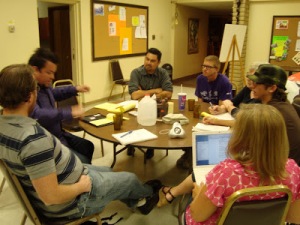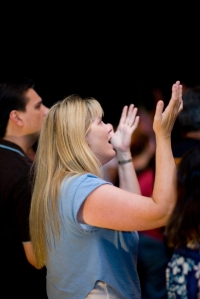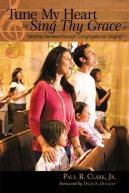 What do you do when worship is not up to your expectations? Songs prove uninspiring, preaching lacks application for you, and maybe you just feel unwelcome for some reason. May I suggest a strong dose of thankfulness? You probably do not need to look very far to find it, and it can turn your spirit toward worship mighty quick. Happened to me the other night while checking email at home.
What do you do when worship is not up to your expectations? Songs prove uninspiring, preaching lacks application for you, and maybe you just feel unwelcome for some reason. May I suggest a strong dose of thankfulness? You probably do not need to look very far to find it, and it can turn your spirit toward worship mighty quick. Happened to me the other night while checking email at home.
I almost never do this, but I clicked on one of those quizzes that you see on the internet. It came as a link in an email I received from WebMD so I figured it was ok, and besides, the title caught my attention so I thought, “What the heck? Give it a look.” It was called a Happiness Quiz. Once sucked in I started to answer the questions and then I got to the one that read something like this:
What does more to boost your own sense of happiness? Pleasure or Gratitude?
I knew my answer right off, but didn’t click the response just yet. Instead I just mused on the question. I will spare you the details of what all crossed my mind on the pleasure side of the equation, but as I contemplated gratitude it triggered a 30-minute reflection that morphed from remembrance to heart-filled worship. First thing I knew my eyes grew misty, and then the tears started to flow as I thought about people, places, and things that have meant so much over the course of my life. Gratitude fostered remembrance of so much grace. I started out thinking how grateful I am for family, immediate and extended. Then there was the spinoff considerations of how we have been blessed by church family when needs have so often been met in all sorts of circumstances. I thought of how much wise council I have gotten from pastors, deacons, and friends at just the right times. So many directions for this thinking to go, it is almost endless because everything for which I am thankful brings to mind people, places, things that unleash another flurry of reasons for unbridled gratitude. Even thoughts of times when finances were stark, or when health scares had us on our knees brought waves of thankfulness as I recalled all the ways God provided and faith was strengthened. Of course reflection of this nature brings to mind loved ones who have been so much a part of life’s journey who are now separated from us by death. Again, another wave of heart-stuffing thankfulness to know we will see them again. When I looked back at the computer screen to try and finish the quiz I went back to thinking about pleasures to remake my comparison. That brought to mind how every pleasure, from planning and enjoying our first ever cruise to the smell of bacon and coffee on a Saturday morning to the running embrace of a grandchild to the telling of funny stories at bedtime to those same grandkids and the sound of their incessant giggling. It struck me that even in recalling the pleasures I was basking in gratitude. My answer would be correct. My answer was Gratitude. Click. Yep! The screen said my answer was right. And so right it was and is.
In this month of November, when a day of thanksgiving is officially scheduled, for which I am grateful by the way, I am reminded that for Christian worshipers thanksgiving should be a basic condition of life. It is certainly a prerequisite spirit for worship. The Apostle Paul is especially instructive about this attitude which I believe to be foundational to a true worshiper’s heart condition. Paul reflects the attitude as he thinks of his brothers and sisters in Christ, as he considers all that God has done, and as he considers how he wants to lead those under his influence.
I thank my God every time I remember you. Philippians 1:3
How can we thank God enough for you in return for all the joy we have in the presence of our God because of you? 1 Thessalonians 3:9
Let the peace of Christ rule in your hearts, since as members of one body you were called to peace. And be thankful. 16 Let the message of Christ dwell among you richly as you teach and admonish one another with all wisdom through psalms, hymns, and songs from the Spirit, singing to God with gratitude in your hearts. Colossians 3:15-16
Therefore, since we are receiving a kingdom that cannot be shaken, let us be thankful, and so worship God acceptably with reverence and awe. Hebrews 12:28
Worshipers in the Old Testament were admonished toward a grateful disposition as well. Their worship songbook was loaded with exhortation to praise in a spirit of thankfulness, and the prophets kept them looking toward everlasting thanks.
Let us come before him with thanksgiving and extol him with music and song. Psalm 95:2
Enter his gates with thanksgiving and his courts with praise; give thanks to him and praise his name. Psalm 100:4
The Lord will surely comfort Zion and will look with compassion on all her ruins; he will make her deserts like Eden, her wastelands like the garden of the Lord. Joy and gladness will be found in her, thanksgiving and the sound of singing. Isaiah 51:3
From them will come songs of thanksgiving and the sound of rejoicing. I will add to their numbers, and they will not be decreased; I will bring them honor, and they will not be disdained. Jeremiah 30:19
I may not be happy all the days of my life, but by God’s grace I pray to be ever thankful, and one day to enter heaven’s gates as a worshiper full of gratitude for His unmerited favor!










